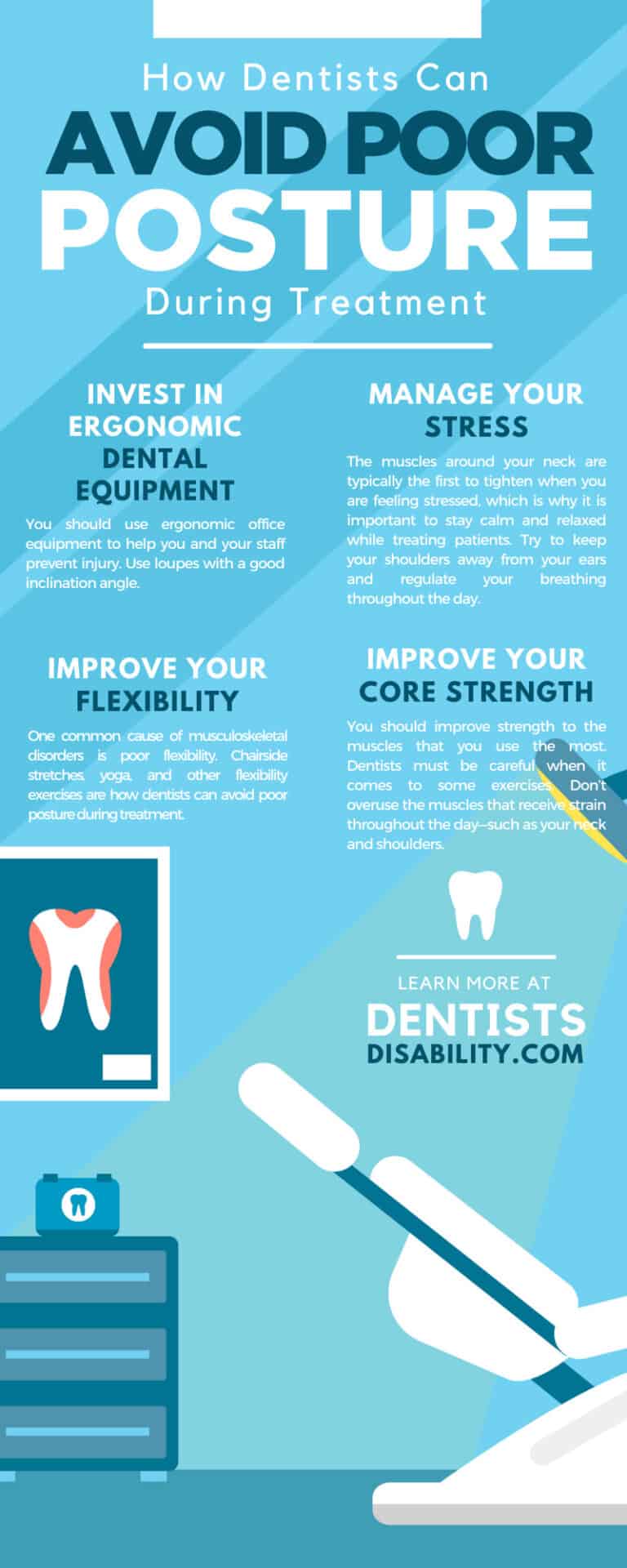How Dentists Can Avoid Poor Posture During Treatment

Is back and shoulder pain making it difficult for you to put in hours at your dental practice? As a dentist, you know that nothing is more disruptive to your day than pain. When you are with a patient, you need to focus on your client rather than what is ailing you. You must maintain excellent posture to avoid the injuries that can arise from bending, stooping, and hunching but sometimes there is no way around having to break your good posture. Knowing how dentists can avoid poor posture during treatment is important to your practice for many reasons.
If you have started experiencing pain that keeps you up at night, you may need to practice better ergonomics. Keeping your spine aligned throughout the day is important to your health. Good posture and ergonomics are about more than relieving stress from the body and avoiding repetitive movements. It also involves balancing the light in your space and keeping the room at a comfortable temperature so that your staff can focus on the good postures they are supposed to keep.
Causes of Poor Posture
You can prepare yourself and your staff with knowledge about how to properly position yourself when working in a dental office, but poor posture issues can still happen. Your office might have dental chairs that make it difficult to maintain good posture. Some chairs require you to position yourself awkwardly to maneuver around the chair and the patient. Further, you must hold the same position for extended periods of time to clean teeth.
To reach every part of a patient’s mouth, you may have to forgo good posture. It is uncomfortable for patients to lie in certain positions that would allow doctors to see and clean the hardest to reach areas of the mouth. Additionally, procedures can take longer to ensure quality, which is another reason why you must sit in the same positions for extended periods.
Effects of Poor Posture
The effects of poor posture develop over time and may be difficult to notice at first. Musculoskeletal disorders are common in many professions and tend to affect most dentists. By the time you notice the symptoms of poor posture, it is often too late to reverse the side effects or your habits. Common effects of poor posture include:
- Neck pain
- Shoulder pain
- Stiff back
- Carpel tunnel
- Arthritis
Pro Tip: A debilitating disorder brought on by poor posture can be triggered by an accident outside of work. Lifting something heavy could hurt your back and make it difficult to maintain good posture.
Solutions to Posture Problems
You can prevent injuries while working in a dental office. Dentists sit for prolonged periods of time, which can lead to a weak back and core. Specific tools and exercises can help strengthen your muscles and prevent you from losing your strength at all.
Invest in Ergonomic Dental Equipment
Ergonomics are important to your dental office to prevent musculoskeletal disorders. You should use ergonomic office equipment to help you and your staff prevent injury. Use loupes with a good inclination angle. Decide if it makes sense to use stools and chairs that have a back. You should use lightweight tools that are not difficult for you or your staff to maneuver. Additionally, your dental chairs should angle the patient in a position that is comfortable for them while allowing you to see their entire mouth.
Pro Tip: Offices that use ergonomic equipment experience improved productivity and less stress amongst staff.
Manage Your Stress
Whether you’ve noticed it or not, your shoulders and neck get tense when you are on edge. The muscles around your neck are typically the first to tighten when you are feeling stressed, which is why it is important to stay calm and relaxed while treating patients. Try to keep your shoulders away from your ears and regulate your breathing throughout the day. Mindfully changing your posture and focusing on improving your stress can lead to a more fulfilling workday.
Improve Your Flexibility
One common cause of musculoskeletal disorders is poor flexibility. Chairside stretches, yoga, and other flexibility exercises are how dentists can avoid poor posture during treatment. You can use these exercises to improve your flexibility between patients and work out the areas where you feel off balance. Focus on stretching the muscles that feel tight; do not over stretch muscles that are already lose. Stretching prepares you for muscle strengthening, which can also help you avoid poor posture and work-related injuries.
Improve Your Core Strength
You should improve strength to the muscles that you use the most. Dentists must be careful when it comes to some exercises. Don’t overuse the muscles that receive strain throughout the day—such as your neck and shoulders. Additionally, you should not work out a muscle that is in pain.
Pro Tip: Massage is only a short-term solution. While a massage may alleviate your pain for a short time, your aches and pains will return if you don’t take steps to prevent it from happening in the first place.
Long-Term Effects of Work-Related Musculoskeletal Disorders
Though the long-term effects of work-related musculoskeletal disorders can take time to set in, the consequences of poor posture can be life-long. Even with physical therapy, medications, and surgery, many potential conditions can cause persistent discomfort. Possible long-term effects of poor posture include:
- Increased absence from work
- Persistent pain
- Constant discomfort
- Inability to work
- Disability
While you can practice good posture in your workplace, injuries outside of work and the demands of patients can cause wear and tear on your neck, back, and shoulders. Stay flexible and keep your office stress-free to ensure you set your staff up for success. Another way to keep your stress low is by preparing for the future. Know that you and your business are safe when you invest in the right dentist income protection insurance.
Agents at Dentist Disability Insurance have experience working with the nation’s top “own occupation” disability insurance providers. We will provide you with unbiased advice about which options are right for you and your dental practice. Since our professionals only work with dentists, we know the specific needs that come with your business. Contact us today!

